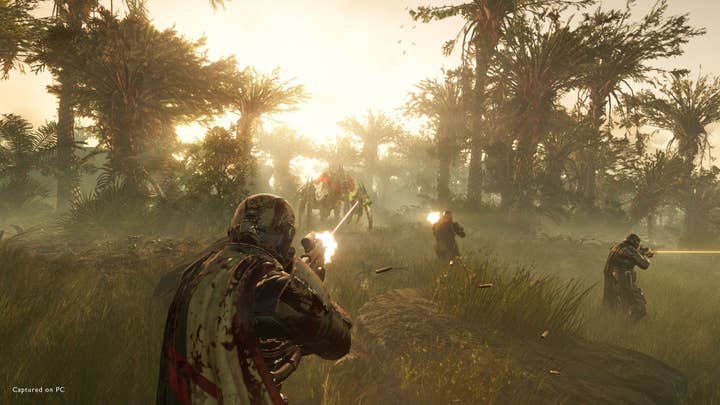Sony’s PC learning curve hits an incline | Opinion
A rapid but embarrassing climb-down over PSN logins for Helldivers 2 reveals just how much learning Sony still must do if it intends to become a major PC publisher
Now that Sony releasing its first-party titles on PC as well as PlayStation has become relatively commonplace, it’s easy to lose sight of what a major change in strategy this represents.
Since Sony entered the console market thirty years ago, it has devoted an immense amount of time, money, and focus to building up a studio system to deliver a steady flow of high-quality exclusive games for PlayStation platforms. It’s not a system without its flaws or occasional failures, but it’s arguably produced the most consistent and impressive studio portfolio any publisher in this industry has ever had – rivalling, if not surpassing, Nintendo’s also superb studio system.
The output of these studios is the beating heart of the PlayStation brand; the decision that their games should also launch on the PC, made a few years ago and now bearing regular fruit, is one of the biggest strategic shifts in the history of Sony as a games company.
In a sense, this is a case of the tail starting to wag the dog; Sony’s game studios, created and curated to provide the game pipeline that would cement PlayStation’s success in the console market, are now so successful that the company wants to find new commercial outlets for the games they create. This isn’t all that unusual in the business world, with perhaps the most famous example being Amazon creating cloud computing infrastructure to run its e-commerce site on, then realising it could make even more money by selling that infrastructure to everyone else, including its own competitors.
Sony knows that creating the expectation that its exclusive titles will end up on PC as well will have some impact on PlayStation hardware sales, and it has judged that this is acceptable in the face of the increased software sales it can achieve by porting its games across.
This really is new territory for Sony. Its past forays into PC publishing were largely confined to the MMORPG space, which it tentatively explored at a very distinct arm’s length from the PlayStation brand via the Sony Online Entertainment business unit up until the mid-2010s (when it sold off the division, which was subsequently renamed Daybreak Games).
Sony’s move to make PSN logins compulsory was high-handed, ill-considered, and smacked of a profound level of ignorance about the market they’re now operating in
Now, after a tentative start with a few early titles, the company seems genuinely committed to putting all of the PlayStation’s crown jewels on PC: Horizon, The Last of Us, God of War, Uncharted, Spider-Man, and so on. Granted, all of these launched quite a long time after initially appearing on PS5, but it’s reasonably safe to assume at this point that any major first-party PlayStation release is effectively a timed exclusive, with a PC version in the works to launch quite a few months down the line.
As with any new territory for a company, there’s a learning curve involved. Some of that is on the technical side of things – the PC is a complex, fragmented platform and porting games in a way that works well for all players and their varied hardware is far from an easy task. Some of the learning, however, is to do with the environment of the PC market itself; it’s about a company whose experience of the games business has almost exclusively been within its own walled garden learning how to navigate a market that’s far more complex and filled with factors and actors that are ultimately outside Sony’s control.
Over the past week we’ve seen what could charitably be called a learning experience, and less charitably be called a total cock-up, over Sony’s handling of its newest PC title, Helldivers 2.
Arrowhead Game Studios’ co-op action shooter is one of the runaway hits of the year so far, and is Sony’s first bona fide PC blockbuster. It’s also an unusual title in Sony’s PC portfolio – launched simultaneously on PS5 and PC, rather than being a months-later port of a PS5 title, it may be an early glimpse of the kind of strategy the company has in mind for building a portfolio of live service games.
The problem that arose is simple on the surface of it. At launch, Helldivers 2 had a PlayStation Network login window, which could be clicked past and skipped without any impact on the ability to play the game. The ability to skip this login was apparently designed to bypass possible server problems at launch – so last week, Sony announced that it would finally start enforcing the PSN login requirement, initially for new accounts and then later for existing accounts as well.
Cue a massive backlash from players, not least because it transpired that Helldivers 2 had been sold in an enormous number of countries (177 territories in total) where PSN isn’t even available, so players wouldn’t be able to legally meet this new requirement. The game was consequently removed from sale in all of those countries, and online storefronts started issuing refunds to owners, even in cases where they had hundreds of hours of gameplay logged.
[Helldivers 2] may be an early glimpse of the strategy Sony has in mind for live service games
Two days later, Sony backtracked on the account linking policy, but not before Helldivers 2 had racked up tens of thousands of negative Steam reviews from angry players.
There’s been a bit of concerned clucking about review-bombing and demanding refunds as strategies employed by disgruntled players, and there’s no question that this kind of approach causes lasting damage – even with the policy reversed, the hit to the game’s rating on Steam will take a very long time to iron out. Certainly, these strategies are also employed maliciously by people trying to wreck games’ ratings over content they don’t like or personal dislike of the developers, and protecting against those instances as much as possible remains something Steam and other storefronts should work on.
This, however, was something very different.
Sony’s move to make PSN logins compulsory was high-handed, ill-considered, and smacked of a profound level of ignorance about the market they’re now operating in – and it was absolutely Sony’s move, as it seemed quite clear that Arrowhead, who had a much better understanding of the PC game market and of their players, had tried to dissuade Sony from this approach and failed.
The decision would have robbed players in a very significant chunk of the planet of the ability to log into a game they’d already paid for; this is absolutely the sort of genuinely problematic, disruptive, and unfair behaviour that a game community should be getting animated and upset about. They used the only tools at their disposal to protest, and got Sony to back down, and that’s exactly as it should be.
This section of the learning curve Sony is on has a particularly steep gradient. At the heart of this, I think, is that Sony has spent decades publishing games exclusively on a platform it controls – the hardware, the operating system, the digital store, the online services. Deciding that consumers need to log in to a Sony online service to play a Sony game is something that wouldn’t even raise an eyebrow on PS5. Sony’s control suffuses that platform; if you’re using a PS5, buying games from the PS Store, then you’re a Sony customer with a Sony account by default. If you’re buying a multiplayer game, you’re a PS Plus subscriber. This is how PlayStation works – and it’s (largely) unproblematic, much like iPhone users having an Apple account by default doesn’t raise eyebrows.



But on PC, Sony controls only the game. The hardware is generic, the operating system is built by Microsoft, the online stores operated by various companies (but primarily by Valve). Things Sony takes for granted, such as having control over which countries and regions its platform is sold in, are entirely outside of its purview on PC. It’s entirely credible – albeit still deeply unimpressive – that some conference table of managers at Sony would insist on rolling out the PSN change without actually having the knowledge or insight into the PC market to realise that the existence of consumers in countries where PSN isn’t available was even an issue; on PlayStation, that just isn’t a concern that exists.
Perhaps the hardest and most important lesson Sony must take away from this, however, is to do with its relationship with digital storefronts on PC. For all that consumer pressure clearly had a major effect here, the role played by Steam in forcing Sony to reverse its decision was likely crucial. By instituting a PSN login requirement that hadn’t been there at the outset and could not be fulfilled by players in many countries, Sony put Steam into the position of having to make a judgment on refund policies – and it should have been fairly clear to Sony how that judgment was going to fall, but apparently wasn’t.
Again, this is a situation where on PlayStation, all the decision-making apparatus would be internal to Sony itself, as it’s selling its games on a storefront it operates, to people using hardware it operates. On PC, by contrast, there are multiple other companies (most notably Valve and Microsoft) who are responsible for major decisions that impact Sony’s games, and learning how to ensure that the company doesn’t fall foul of those partners is in some ways just as important as learning how to manage relationships with the PC playerbase.
Things Sony takes for granted are entirely outside of its purview on PC
It's never been entirely clear what Sony’s expected endgame as a PC publisher is. It’s entirely possible that the company is just happy to have a new revenue stream for its highly acclaimed games and doesn’t have any long-term plan beyond that, in which case this learning curve remains important, but mistakes along the way are more tolerable.
It’s also possible, though, that it sees itself ultimately trying to bring some form of PS Plus / PS Store offering to the PC, and views getting its players onto PSN as a key step towards that goal. Certainly, some of the players protesting the Helldivers 2 change are concerned that this is the long-term plan; the fact that PS5 players have to play a PS Plus subscription fee to play online multiplayer games was repeatedly cited as a reason to be wary of PSN login requirements in games.
If building towards having a services offering on PC really is part of Sony’s long-term plan, this week’s events will hopefully have triggered some careful consideration and reflection. There’s a big, lucrative market here, for sure, but it’s not one that can be navigated with the same mindset as PlayStation – and recognising how much learning there is to do is an essential first step to getting it right.




